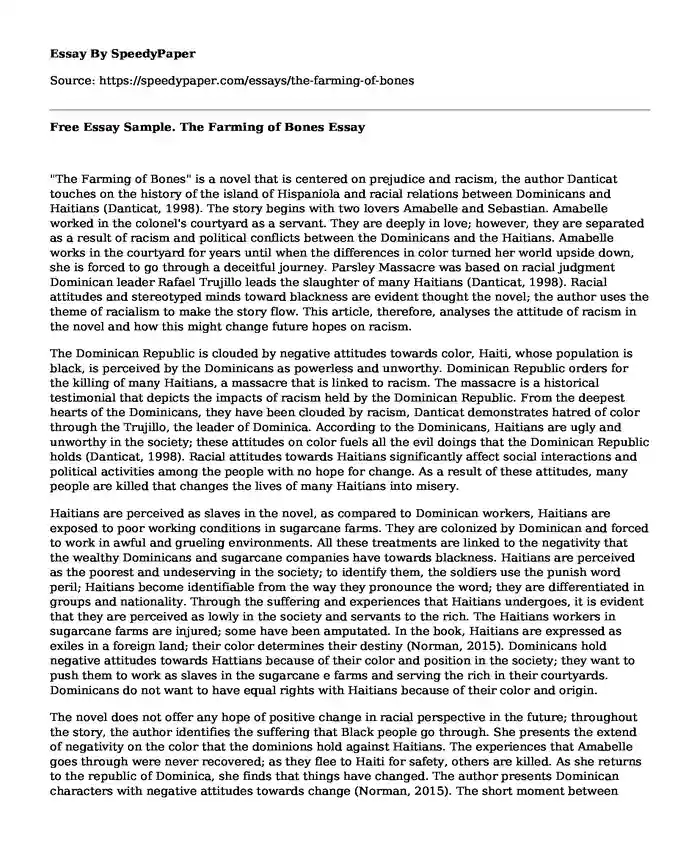
| Type of paper: | Essay |
| Categories: | Racism Discrimination Stereotypes Books |
| Pages: | 3 |
| Wordcount: | 733 words |
"The Farming of Bones" is a novel that is centered on prejudice and racism, the author Danticat touches on the history of the island of Hispaniola and racial relations between Dominicans and Haitians (Danticat, 1998). The story begins with two lovers Amabelle and Sebastian. Amabelle worked in the colonel's courtyard as a servant. They are deeply in love; however, they are separated as a result of racism and political conflicts between the Dominicans and the Haitians. Amabelle works in the courtyard for years until when the differences in color turned her world upside down, she is forced to go through a deceitful journey. Parsley Massacre was based on racial judgment Dominican leader Rafael Trujillo leads the slaughter of many Haitians (Danticat, 1998). Racial attitudes and stereotyped minds toward blackness are evident thought the novel; the author uses the theme of racialism to make the story flow. This article, therefore, analyses the attitude of racism in the novel and how this might change future hopes on racism.
The Dominican Republic is clouded by negative attitudes towards color, Haiti, whose population is black, is perceived by the Dominicans as powerless and unworthy. Dominican Republic orders for the killing of many Haitians, a massacre that is linked to racism. The massacre is a historical testimonial that depicts the impacts of racism held by the Dominican Republic. From the deepest hearts of the Dominicans, they have been clouded by racism, Danticat demonstrates hatred of color through the Trujillo, the leader of Dominica. According to the Dominicans, Haitians are ugly and unworthy in the society; these attitudes on color fuels all the evil doings that the Dominican Republic holds (Danticat, 1998). Racial attitudes towards Haitians significantly affect social interactions and political activities among the people with no hope for change. As a result of these attitudes, many people are killed that changes the lives of many Haitians into misery.
Haitians are perceived as slaves in the novel, as compared to Dominican workers, Haitians are exposed to poor working conditions in sugarcane farms. They are colonized by Dominican and forced to work in awful and grueling environments. All these treatments are linked to the negativity that the wealthy Dominicans and sugarcane companies have towards blackness. Haitians are perceived as the poorest and undeserving in the society; to identify them, the soldiers use the punish word peril; Haitians become identifiable from the way they pronounce the word; they are differentiated in groups and nationality. Through the suffering and experiences that Haitians undergoes, it is evident that they are perceived as lowly in the society and servants to the rich. The Haitians workers in sugarcane farms are injured; some have been amputated. In the book, Haitians are expressed as exiles in a foreign land; their color determines their destiny (Norman, 2015). Dominicans hold negative attitudes towards Hattians because of their color and position in the society; they want to push them to work as slaves in the sugarcane e farms and serving the rich in their courtyards. Dominicans do not want to have equal rights with Haitians because of their color and origin.
The novel does not offer any hope of positive change in racial perspective in the future; throughout the story, the author identifies the suffering that Black people go through. She presents the extend of negativity on the color that the dominions hold against Haitians. The experiences that Amabelle goes through were never recovered; as they flee to Haiti for safety, others are killed. As she returns to the republic of Dominica, she finds that things have changed. The author presents Dominican characters with negative attitudes towards change (Norman, 2015). The short moment between Amabelle and Javier offers no hope for change as their attempt to bridge boundaries and cultures fails.
On the other hand, the author presents Trujillo with negative attitudes towards blackness throughout the novel; he led the massacre; he never changes his perspective. His authority is filled with racism and hatred; it is evident from his desire to kill all the Haitians. The author primarily expresses the life experiences of Haitians in the Dominican Republic of racist attitudes towards them; it dosed not offer hope for future change.
References
Danticat, E. (2020). The farming of bones: A novel. Retrieved from: https://www.litcharts.com/lit/the-farming-of-bones/characters/doctor-javier
Norman, B. (2015). The survivor's dilemma in Edwidge Danticat's The Farming of Bones. Contemporary Women's Writing, 9(3), 401-415. Retrieved from: https://doi.org/10.1093/cww/vpv017
Cite this page
Free Essay Sample. The Farming of Bones. (2023, Apr 23). Retrieved from https://speedypaper.net/essays/the-farming-of-bones
Request Removal
If you are the original author of this essay and no longer wish to have it published on the SpeedyPaper website, please click below to request its removal:
- Essay Sample about Great Educational Background
- A Performance Culture - Free Essay on Management
- Business Essay Sample: Review of the Solyndra Bankruptcy and Current Events
- Free Essay Example on Drug Addiction Slavery
- Psychology Essay Example: Prison Overcrowding
- Essay Sample on Improving Personal and Organizational Communication
- Essay Sample on Chemo-enzymatic Biotransformation
Popular categories




